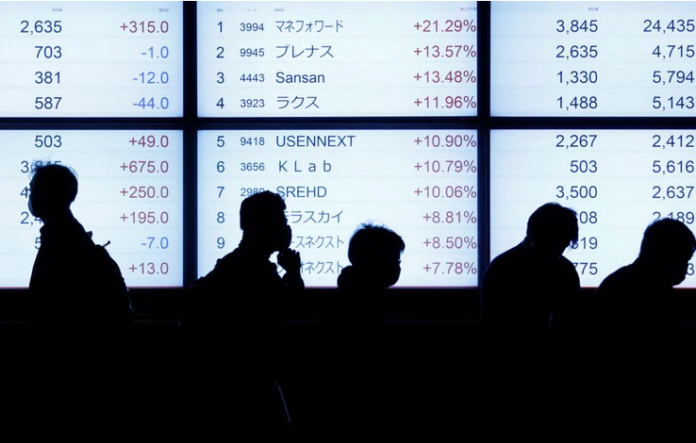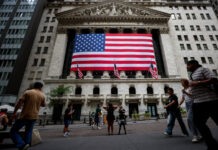
Stocks sagged and bond yields firmed on Thursday as looming central bank rate meetings cast a shadow over largely resilient corporate earnings so far which have failed to dispel downbeat investor sentiment.
The strong dollar continued to loom over currency markets, with the yen sinking to a 32-year low against the greenback. Investors braced for intervention as the Japanese currency fell below 150 for the first time since 1990.
U.S. 10-year Treasury yields touched a 14-year high, while 2-year German government bond yields rose to their highest since December 2008.
“There is a concern the economy over the course of the next 12 months are going to be extraordinarily difficult, with the mood slightly pessimistic when it comes to corporate earnings,” said Mike Hewson, chief markets analyst at CMC Markets.
Investors were readying for anticipated hefty rate hikes from the European Central Bank next week, and the U.S. Federal Reserve and the Bank of England in the following week, Hewson said.
The MSCI all country stock index (.MIWD00000PUS) was down 0.2%, adding to its 25% drop so far this year, wiping out the gains clocked up in 2021.
In Europe, the STOXX (.STOXX) index of 600 companies was down 0.5%, down almost 20% for the year so far, as downbeat earnings from chip equipment firm BE Semiconductor and telecom company Nokia fuelled fears of economic slowdown.
Eren Osman, managing director of wealth management at Arbuthnot Latham & Co, said earnings so far in the United States and elsewhere have shown resilence as many companies beat expectations.
But earnings are likely to fall next year which, along with anticipated interest rate hikes in the United States and elsewhere, are already largely priced into markets, Osman said.
“Once we start to see the ISM manufacturing data start to trough, the markets will get some confidence that we have seen the worst of it. A lot of people are waiting for that moment of capitulation and it might not happen,” Osman said.
ON YEN INTERVENTION WATCH
Asian shares fell on Thursday to their lowest since April 2020 as risk appetite among investors faded after inflation data across the globe re-ignited fears of aggressive interest rate hikes by the Fed.
MSCI’s broadest index of Asia-Pacific shares outside Japan (.MIAPJ0000PUS) fell as much as 0.8%, leaving it down about 29% for the year.
China’s stock market (.SSEC) fell while Hong Kong stocks (.HSI) hit levels last seen during the 2008-09 global financial crisis.
China on Thursday kept its benchmark lending rates unchanged for a second straight month as authorities held off unleashing more monetary stimulus to avoid stark policy divergence with other major economies.
Japanese Finance Minister Shunichi Suzuki vowed to take “appropriate steps” against excessive volatility in the yen.
“I think the risk of another intervention continues to be very high,” said Commonwealth Bank of Australia strategist Carol Kong. “It is a matter of time before they come into the market to support the yen.”
Sterling eased to $1.121 as Britain’s Prime Minister Liz Truss struggled to retain a grip on power.
“It’s worth considering whether a call for a General Election might actually be positive for sterling,” ING economists said in a note.
The offshore yuan fell to a record low on Thursday. It bottomed at 7.2794 per dollar, the lowest level since such data first became available in 2011, and last traded 7.2500.
On Wednesday, Federal Reserve Bank of Minneapolis President Neel Kashkari said job market demand remains strong and underlying inflation pressures probably have not peaked yet.
The U.S. central bank is widely expected to raise rates by 75 basis points for the fourth straight time at its November meeting.
The rise in the dollar and yields pushed gold lower, with prices lingering at a three-week trough on Thursday. /GOL
Oil prices gained around $1 as investor sentiment rose on news that China is considering a cut in the duration of quarantine for inbound visitors.
Brent crude futures for December settlement rose 1.43% to $93.76 a barrel. U.S. West Texas Intermediate crude for November delivery , which expires on Thursday, rose 1.8% to $87.10 per barrel.

















